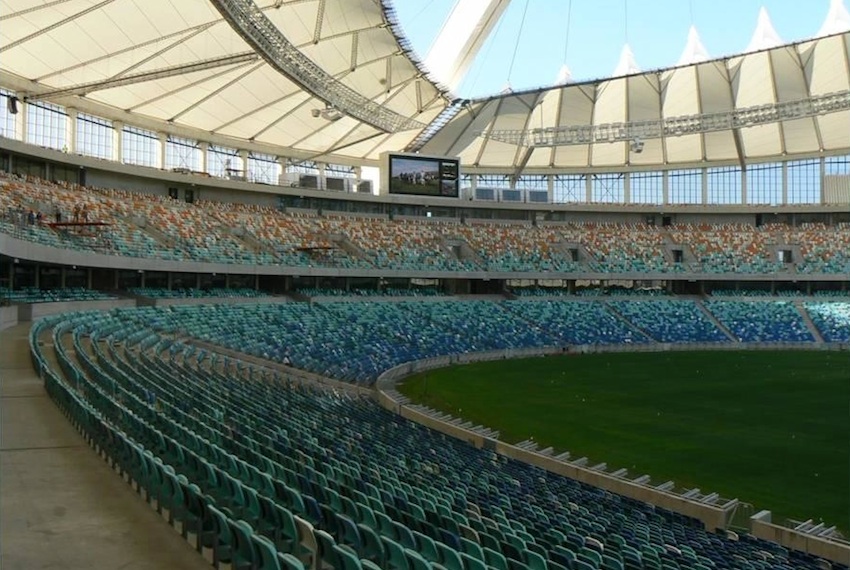Heart Transplant Recipients Head to World Transplant Games

The Marvin brothers will play soccer at the Moses Mabhida Stadium in Durban, South Africa during the World Transplant Games. Image via World Transplant Games Facebook.
Brock and Connor Marvin can understand each other’s life experiences better than most brothers. They’re both active young men who love to play and watch sports. They both enjoy soccer and golf. And they were both born with a genetic heart condition that required them to receive heart transplants within a year and a half of each other. Oh, and they’re also competing in the World Transplant Games in South Africa this week, playing golf, ping-pong, volleyball, and badminton together. How’s that for sibling bonding?
Brock and Connor are just two years apart and they grew up playing sports together. In 2008, Brock, then 14, was playing with the dog in his family’s backyard when he collapsed without warning, according a report by Boston Children’s Hospital.
He was rushed to the nearest emergency room while convulsing and shouting, and was later transported to a larger hospital in Vermont after he was stabilized. There, tests revealed that Brock had dilated cardiomyopathy, a disease that prevents the heart muscle from pumping blood correctly. Doctors said that his disease was advanced, so the Marvins headed to Boston Children’s Hospital for treatment.
Brock was placed on medication and given a defibrillator, according to Boston Children’s. He was able to go home, but was told that he would eventually need a heart transplant to survive. In the report, Brock explains that the transplant was less worrisome than the fact that he would have to stop playing most sports:
“I was devastated,” Brock remembers. “Sports was how I defined myself, so to have them taken away so suddenly was almost unbearable.”
Connor, the younger brother of the two, was tested for the same heart condition after Brock’s collapse. Although initial tests showed that his heart was ok, genetic tests at Boston Children’s confirmed that Brock, like Connor, had dilated cardiomyopathy. According to the report from Boston Children’s, Connor’s disease had not progressed as quickly as his brother’s, so he was only given medication.
In November 2010, Brock received a heart transplant when his health began to fail. Eventually, according to Boston Children’s, he was able to rejoin the sports teams that he loved after recovering from his transplant. During Brock and Connor’s first game on the soccer field together, however, Connor’s heart started to fail. Three and a half months later, Connor, like his brother, underwent a heart transplant at Boston Children’s. In the report, Boston Children’s says that Connor and Brock have now returned to their routines together after their transplants:
These days, with the exception of the anti-rejection medicine they take to keep their transplanted hearts healthy, both Connor and Brock say their lives have completely returned to normal. Each is back in school and heavily involved in athletics, with little evidence that anything in their lives has changed since first coming to Boston.
We’d even venture to say that the brothers are back to better than normal— from July 28 to August 4, Connor and Brock will be competing in the World Transplant Games in Durban, South Africa, an international sporting event held each year to demonstrate the successes of transplant surgeries and to raise awareness for organ donation.
“Representing the US and transplant recipients is an honor,” Brock said in the Boston Children’s report. “But for me, I think the best part will be raising a first place medal in my brother’s face. Now that we’re both recovered, I’m looking forward to having that sibling rivalry heat up again. I can’t imagine a better place to do it than an Olympic golf course.”


